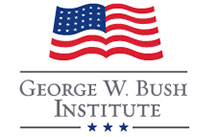
A clear majority of Americans—55 percent—view the country’s democracy as “weak,” and 68 percent say it is “getting weaker,” according to the sobering results of a major bipartisan poll published Tuesday. A narrow majority (50–43 percent) believe that the U.S. is in “real danger of becoming a nondemocratic, authoritarian country.”
However, a majority of respondents endorses the proposition that democracy and human rights should play a role in U.S. foreign policy, according to the survey commissioned by Freedom House, the George W. Bush Institute, and the Penn Biden Center for Diplomacy and Global Engagement.
 Some 71 percent favor “the U.S. government taking steps to support democracy and human rights in other countries,” with the moral argument considered the most persuasive. A significant 91 percent majority agree that “we can’t control what happens in the world, but we have a moral obligation to speak up and do what we can when people are victims of genocide, violence, and severe human rights abuses.”
Some 71 percent favor “the U.S. government taking steps to support democracy and human rights in other countries,” with the moral argument considered the most persuasive. A significant 91 percent majority agree that “we can’t control what happens in the world, but we have a moral obligation to speak up and do what we can when people are victims of genocide, violence, and severe human rights abuses.”
An 84 percent majority concurs that “when other countries become democratic, it contributes to our own well-being,” while a 67–22 percent majority agrees that “when other countries are democratic, rather than dictatorships, it often helps make the U.S. a little safer”—rejecting the alternative position that “there is no impact on US security when other countries move away from dictatorship and become democracies.
Americans overwhelmingly support the democratic idea and show few signs of being seduced by alternative authoritarian ideologies. Asked to rank the importance of living in a democracy on a scale of one to 10, with 10 as “absolutely important,” 60 percent of respondents chose 10.
 “Americans are deeply worried about the health of their democracy and want to make it stronger,” said Michael Abramowitz (left), the president of Freedom House. “There appears to be a crisis in confidence in the functioning of our democracy, and it is not a party-line issue.”
“Americans are deeply worried about the health of their democracy and want to make it stronger,” said Michael Abramowitz (left), the president of Freedom House. “There appears to be a crisis in confidence in the functioning of our democracy, and it is not a party-line issue.”
But Americans are frustrated with the role of money in politics, with 77 percent of respondents endorsing the view that “the laws enacted by our national government these days mostly reflect what powerful special interests and their lobbyists want.”
 “We hope this work can be a step toward restoring faith in democracy and democratic institutions,” said former President George W. Bush, according to The Washington Post.
“We hope this work can be a step toward restoring faith in democracy and democratic institutions,” said former President George W. Bush, according to The Washington Post.
“The findings of the Democracy Project confirm we can’t take our freedoms for granted- we have to work for them, and we have to defend them,” said former Vice President Joe Biden. “It’s also a reminder that our democracy has never been perfect, and we can’t be complacent if we hope to continue to lead in the 21st century.”
![]() “Everyone who has a stake in U.S. democracy—civil society groups, educators, businesses, elected officials, policymakers, and the general public—to think critically about the challenges facing our democracy and take action to rebuild faith in fundamental democratic principles and institutions,” the report states, proposing a number of recommendations:
“Everyone who has a stake in U.S. democracy—civil society groups, educators, businesses, elected officials, policymakers, and the general public—to think critically about the challenges facing our democracy and take action to rebuild faith in fundamental democratic principles and institutions,” the report states, proposing a number of recommendations:
 Call to action: Lean into calls for civic engagement and activism as a means of bolstering American democracy. The phrase “there is a great need for us all to act as responsible citizens—things like voting, volunteering, taking time to stay informed, and standing up for what’s right” was part of the most persuasive message tested in the survey.
Call to action: Lean into calls for civic engagement and activism as a means of bolstering American democracy. The phrase “there is a great need for us all to act as responsible citizens—things like voting, volunteering, taking time to stay informed, and standing up for what’s right” was part of the most persuasive message tested in the survey. - Risks of inaction: When speaking about threats to democracy in the United States, emphasize that Americans risk losing what they value in our system, though not in language so extreme that people forfeit hope. In the survey, the message that generated the most favorable feelings about America’s system of democratic government used the phrase “so that the freedoms and rights we cherish don’t get whittled away.”
- Civic education: Champion a stronger public understanding of democratic principles—especially among young people, who showed less enthusiasm for democracy in the survey. This could be achieved in part through improved and expanded civic education, including the teaching of democracy’s basic concepts. Nearly 90 percent of poll respondents favored a proposal to “ensure that schools make civic education a bigger part of the curriculum.”
- Success stories: Cite individual success stories as much as possible. Survey respondents expressed greater approval for specific past cases of American support than for the concept of such support in the abstract.







